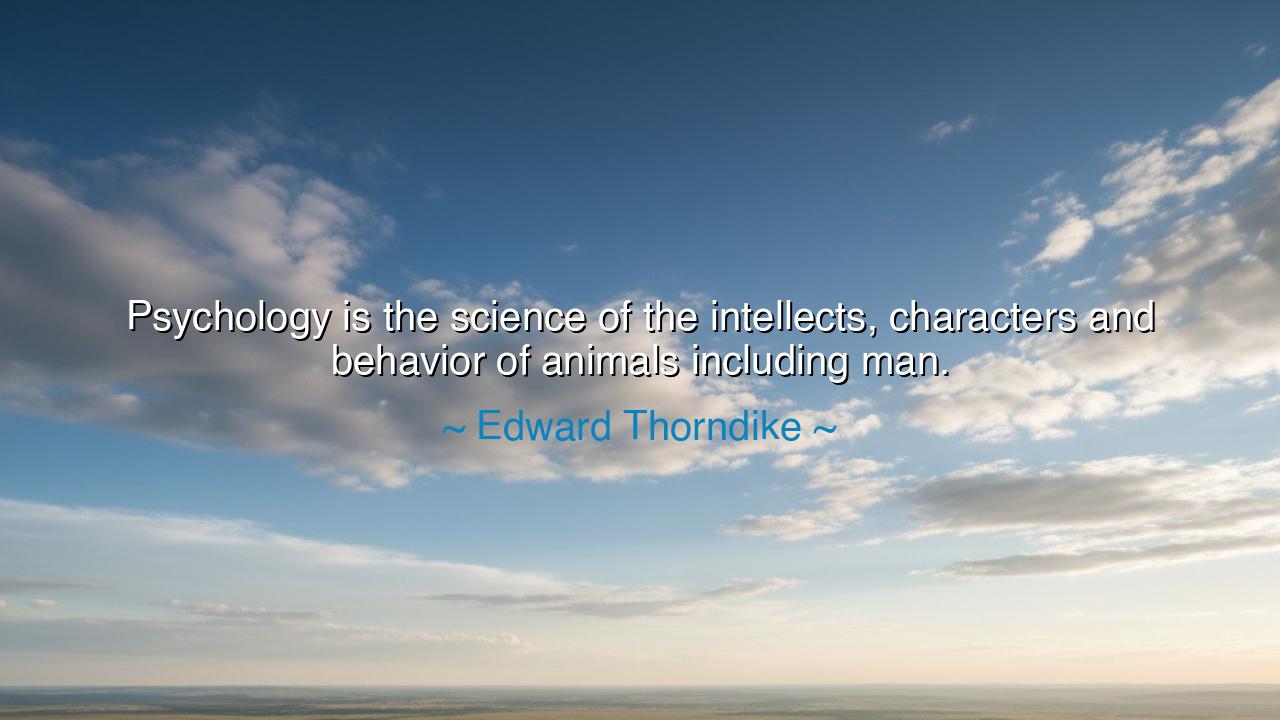
Psychology is the science of the intellects, characters and
Psychology is the science of the intellects, characters and behavior of animals including man.






Hear now, O seekers of wisdom, the profound words of Edward Thorndike: "Psychology is the science of the intellects, characters, and behavior of animals, including man." These words call us to a deeper understanding of the human mind, not as something separate and divine, but as part of a greater natural order, a link in the chain of life that connects us to the animals with whom we share this world. Thorndike invites us to see that the study of psychology is not simply about the complexities of human thought, but about understanding the behavior and mental processes of all creatures, recognizing the continuity between humanity and the animal kingdom.
In the ancient world, the great philosophers like Plato and Aristotle sought to understand the nature of the human soul. Plato, in his dialogues, explored the depths of human reason and the potential for the soul to transcend the physical world, seeking eternal truths. But even Plato did not dismiss the animal nature of human beings. He understood that the soul was shaped by both reason and instinct, that human behavior was influenced by forces both rational and irrational. Aristotle, too, in his observations of the natural world, saw humans as part of a broader system, with their psychological and behavioral traits shaped by nature itself. Both philosophers recognized that understanding human nature meant understanding the whole of the living world, where humans are both creatures of reason and of instinct.
Consider, O wise ones, the story of Charles Darwin, whose theory of evolution reshaped humanity’s understanding of itself in relation to the natural world. In his groundbreaking work On the Origin of Species, Darwin showed that humans were not isolated from the rest of life but were part of the same biological processes that governed the behavior of all living creatures. His theory of natural selection demonstrated that the behaviors and traits of animals—whether their instincts for survival, mating, or social interaction—were not so different from human behavior. Thorndike, like Darwin, sought to place human psychology within this broader biological context, recognizing that the study of the mind is not exclusive to humans but extends to all creatures with consciousness and intellect.
In the modern world, psychology as a science has continued to evolve, from the study of behaviorism to the exploration of the unconscious mind, offering insights into both human and animal intellects. Thorndike’s work on the law of effect—which states that actions followed by positive outcomes are more likely to be repeated—was a key contribution to the understanding of behavior across species. This principle is not exclusive to humans, but can be observed in animals as well. Thorndike’s studies with cats in puzzle boxes, where the cats learned to escape through trial and error, illustrated how animals, much like humans, respond to stimuli and consequences. His work laid the groundwork for much of modern behavioral psychology, showing that the mind and behavior of humans are not so vastly different from the minds of animals—they are merely more complex and developed.
The story of Ivan Pavlov, whose experiments with dogs led to the discovery of classical conditioning, further demonstrates the universality of psychological principles across species. In his experiments, Pavlov showed that dogs could be conditioned to salivate at the sound of a bell if the sound was repeatedly followed by the presentation of food. This discovery not only advanced our understanding of learning and behavior, but also bridged the gap between human and animal psychology, revealing that the processes governing behavior are deeply rooted in biology and shared across the living world.
Thus, O seekers, the lesson is clear: psychology is not a science that confines itself to humans alone. It is the study of the mind, behavior, and character of all creatures, from the simplest organisms to the most complex beings on Earth. Thorndike’s insight calls us to understand that the human mind is part of a broader biological continuum, shaped by both reason and instinct. We must study psychology not just to understand ourselves but to understand our place in the vast web of life, recognizing that the behaviors and thought processes that make us human are deeply intertwined with those of the animals we share this world with.
Let us then, O wise ones, approach the study of the mind with humility and awareness of its roots in the natural world. Whether we are studying the behavior of humans or animals, we must recognize the common thread that runs through all of life—the desire to understand, to adapt, and to thrive. As we seek to understand the mind, let us remember that we are not separate from the animals, but a part of the great chain of life, each of us contributing to the ever-evolving understanding of consciousness and behavior. Let us approach psychology with reverence, seeing it as a bridge between all creatures, helping us to understand not only ourselves but the broader world in which we live.






AAdministratorAdministrator
Welcome, honored guests. Please leave a comment, we will respond soon